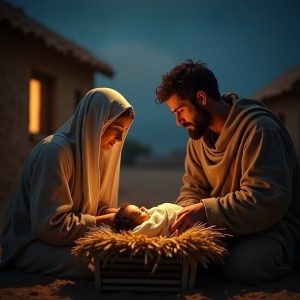“And suddenly there was with the angel a multitude of the heavenly host praising God, and saying, Glory to God in the highest, and on earth peace, good will toward men.” – Luke 2:13–14
The “multitude of the heavenly host” tells us that the birth of Yeshua (Jesus) was a cosmic event. The angelic armies declared the fulfilment of God’s redemptive plan through the Messiah, who brings both heavenly glory and earthly peace.
In the Book of Mormon, we find similar emphasis on the universal significance of Messiah’s coming.
Samuel the Lamanite prophesied a great sign at Messiah’s birth: a new star appearing in the heavens, symbolising divine intervention. “And behold, there shall be great lights in heaven, insomuch that in the night before he cometh there shall be no darkness… and ye shall know of the rising of the sun and also of its setting; therefore they shall know of a surety that there shall be two days and a night as if it were one day.” —Helaman 14:2–6
The “peace on earth” refers to the restoration of harmony between God and humanity through Yeshua. This shalom (peace) is a foretaste of the Kingdom of God that Messiah inaugurates. In Mosiah 3:5–9, we read where King Benjamin speaking of Messiah as the Redeemer who brings salvation and reconciliation to humanity. “For behold, the time cometh, and is not far distant, that with power, the Lord Omnipotent who reigneth, who was, and is from all eternity to all eternity, shall come down from heaven among the children of men… and his name shall be called Yeshua Messiah, the Son of God.”
An additional supporting passage is 3 Nephi 11:10–11. When the resurrected Messiah appears to the Nephites, He declared: “Behold, I am Yeshua Messiah, whom the prophets testified shall come into the world. And behold, I am the light and the life of the world; and I have drunk out of that bitter cup which the Father hath given me, and have glorified the Father in taking upon me the sins of the world.” Through His atonement, He establishes lasting peace.
“Good will toward men” refers to God’s covenantal faithfulness. In Messianic terms, this goodwill is fully realized in those who receive Yeshua as the promised Redeemer, experiencing the fulfillment of the prophecies of Isaiah (e.g., Isaiah 9:6, “Prince of Peace”).
 The Book of Mormon frequently speaks of the Messiah as the ultimate fulfillment of God’s covenant. For example, in 2 Nephi 2:6–8 Lehi teaches about the redemptive mission of Messiah as the manifestation of God’s covenant to humanity. “Wherefore, redemption cometh in and through the Holy Messiah; for he is full of grace and truth. Behold, he offereth himself a sacrifice for sin…” This sacrifice was an act of divine goodwill, offering eternal life to all who receive Him.
The Book of Mormon frequently speaks of the Messiah as the ultimate fulfillment of God’s covenant. For example, in 2 Nephi 2:6–8 Lehi teaches about the redemptive mission of Messiah as the manifestation of God’s covenant to humanity. “Wherefore, redemption cometh in and through the Holy Messiah; for he is full of grace and truth. Behold, he offereth himself a sacrifice for sin…” This sacrifice was an act of divine goodwill, offering eternal life to all who receive Him.
In Ether 3:14, we read where Adonai identifies Himself to the brother of Jared as the fulfillment of God’s covenant. “Behold, I am he who was prepared from the foundation of the world to redeem my people. Behold, I am Yeshua Messiah. I am the Father and the Son.” The Messiah’s coming is the ultimate sign of God’s favor and love for His children.
Elder Ulisses Soares said: “Dear brothers and sisters, the Savior’s life was the perfect example of love and goodwill toward men. He always forgot Himself in behalf of others. His selfless acts were expressed in all He did every day of His life and were not limited to a specific season or holiday. As we turn our hearts outward like the Savior did, I promise that we can better experience the meaning of Christmas. As we do so, I can assure you that we will find limitless opportunities to give of ourselves quietly and kindly to people who need us. This will help us to come to know the Savior better and find for ourselves peace on earth and good will toward men, which will, in great measure, determine the love, peace, and renewed strength that we can feel and share toward others.”

